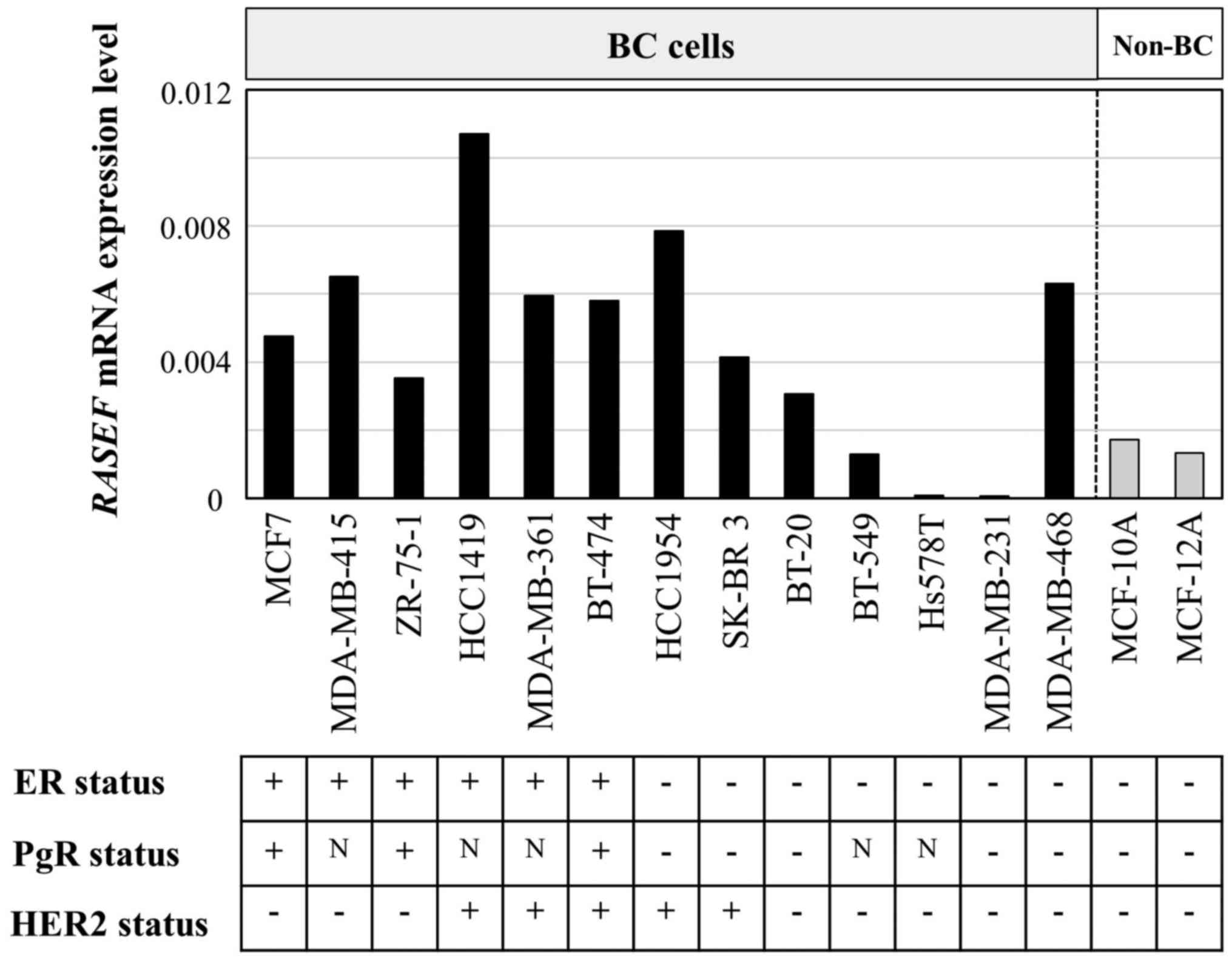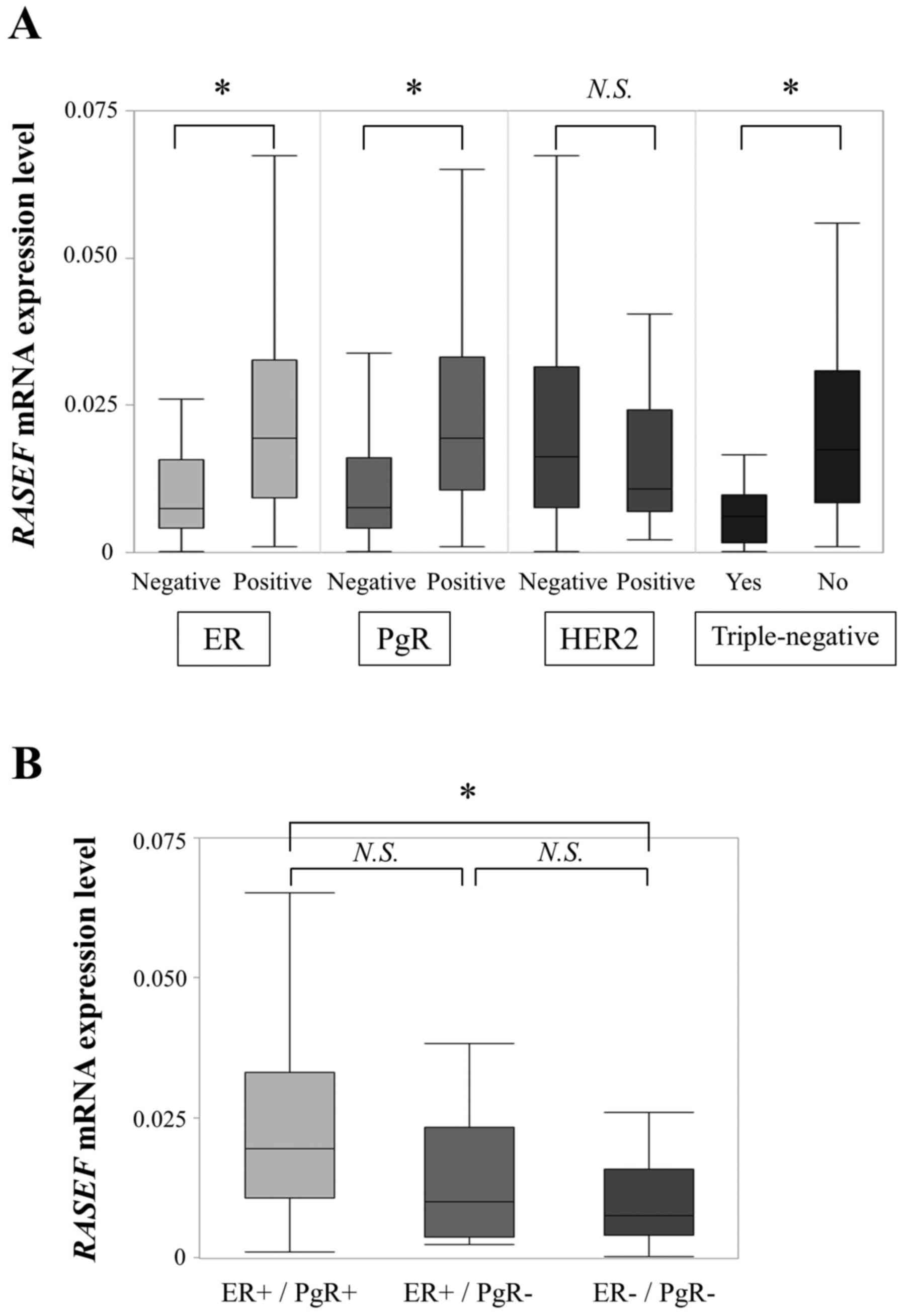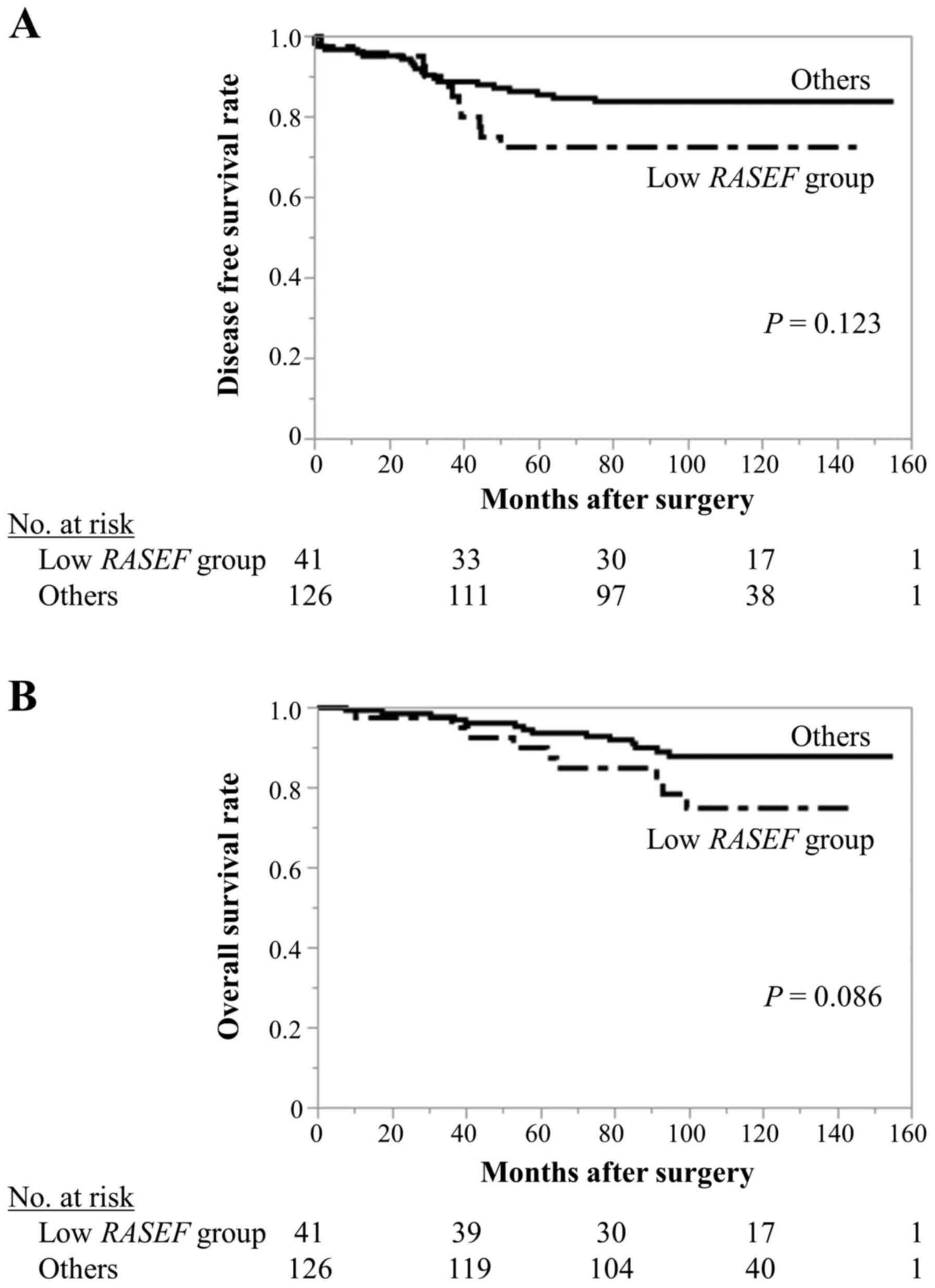|
1
|
Jemal A, Center MM, DeSantis C and Ward
EM: Global patterns of cancer incidence and mortality rates and
trends. Cancer Epidemiol Biomarkers Prev. 19:1893–1907. 2010.
View Article : Google Scholar : PubMed/NCBI
|
|
2
|
Coates AS, Winer EP, Goldhirsch A, Gelber
RD, Gnant M, Piccart-Gebhart M, Thürlimann B and Senn HJ; Panel
Members, . Tailoring therapies-improving the management of early
breast cancer: St Gallen International Expert Consensus on the
Primary Therapy of Early Breast Cancer 2015. Ann Oncol.
26:1533–1546. 2015. View Article : Google Scholar : PubMed/NCBI
|
|
3
|
Shintani M, Tada M, Kobayashi T, Kajiho H,
Kontani K and Katada T: Characterization of Rab45/RASEF containing
EF-hand domain and a coiled-coil motif as a self-associating
GTPase. Biochem Biophys Res Commun. 357:661–667. 2007. View Article : Google Scholar : PubMed/NCBI
|
|
4
|
Kaplon J, Hömig-Hölzel C, Gao LD, Meissl
K, Verdegaal EME, van der Burg SH, Doorn RV and Peeper DS:
Near-genomewide RNAi screening for regulators of
BRAFV600E-induced senescence identifies RASEF, a gene
epigenetically silenced in melanoma. Pigment Cell Melanoma Res.
27:2014. View Article : Google Scholar : PubMed/NCBI
|
|
5
|
Maat W, Beiboer SH, Jager MJ, Luyten GP,
Gruis NA and van der Velden PA: Epigenetic regulation identifies
RASEF as a tumor-suppressor gene in uveal melanoma. Invest
Ophthalmol Vis Sci. 49:1291–1298. 2008. View Article : Google Scholar : PubMed/NCBI
|
|
6
|
Oshita H, Nishino R, Takano A, Fujitomo T,
Aragaki M, Kato T, Akiyama H, Tsuchiya E, Kohno N, Nakamura Y and
Daigo Y: RASEF is a novel diagnostic biomarker and a therapeutic
target for lung cancer. Mol Cancer Res. 11:937–951. 2013.
View Article : Google Scholar : PubMed/NCBI
|
|
7
|
Zhang X, Lin P, Zhu ZH, Long H, Wen J,
Yang H, Zhang X, Wang DF, Fu JH, Fang Y and Rong TH: Expression
profiles of early esophageal squamous cell carcinoma by cDNA
microarray. Cancer Genet Cytogenet. 194:23–29. 2009. View Article : Google Scholar : PubMed/NCBI
|
|
8
|
Nakamura S, Takemura T, Tan L, Nagata Y,
Yokota D, Hirano I, Shigeno K, Shibata K, Fujie M, Fujisawa S and
Ohnishi K: Small GTPase RAB45-mediated p38 activation in apoptosis
of chronic myeloid leukemia progenitor cells. Carcinogenesis.
32:1758–1772. 2011. View Article : Google Scholar : PubMed/NCBI
|
|
9
|
Sweetser DA, Peniket AJ, Haaland C,
Blomberg AA, Zhang Y, Zaidi ST, Dayyani F, Zhao Z, Heerema NA,
Boultwood J, et al: Delineation of the minimal commonly deleted
segment and identification of candidate tumor-suppressor genes in
del(9q) acute myeloid leukemia. Genes Chromosomes Cancer.
44:279–291. 2005. View Article : Google Scholar : PubMed/NCBI
|
|
10
|
Wang S, Hu C, Wu F and He S: Rab25 GTPase:
Functional roles in cancer. Oncotarget. 8:64591–64599.
2017.PubMed/NCBI
|
|
11
|
Chua CE and Tang BL: The role of the small
GTPase Rab31 in cancer. J Cell Mol Med. 19:1–10. 2015. View Article : Google Scholar : PubMed/NCBI
|
|
12
|
Cheng KW, Lahad JP, Kuo WL, Lapuk A,
Yamada K, Auersperg N, Liu J, Smith-McCune K, Lu KH, Fishman D, et
al: The RAB25 small GTPase determines aggressiveness of ovarian and
breast cancers. Nat Med. 10:1251–1256. 2004. View Article : Google Scholar : PubMed/NCBI
|
|
13
|
Yin YX, Shen F, Pei H, Ding Y, Zhao H,
Zhao M and Chen Q: Increased expression of Rab25 in breast cancer
correlates with lymphatic metastasis. Tumour Biol. 33:1581–1587.
2012. View Article : Google Scholar : PubMed/NCBI
|
|
14
|
Kanda M, Shimizu D, Fujii T, Tanaka H,
Shibata M, Iwata N, Hayashi M, Kobayashi D, Tanaka C, Yamada S, et
al: Protein arginine methyltransferase 5 is associated with
malignant phenotype and peritoneal metastasis in gastric cancer.
Int J Oncol. 49:1195–1202. 2016. View Article : Google Scholar : PubMed/NCBI
|
|
15
|
Kanda M, Shimizu D, Nomoto S, Takami H,
Hibino S, Oya H, Hashimoto R, Suenaga M, Inokawa Y, Kobayashi D, et
al: Prognostic impact of expression and methylation status of
DENN/MADD domain-containing protein 2D in gastric cancer. Gastric
Cancer. 18:288–296. 2015. View Article : Google Scholar : PubMed/NCBI
|
|
16
|
Shibata M, Kanda M, Shimizu D, Tanaka H,
Umeda S, Hayashi M, Inaishi T, Miyajima N, Adachi Y, Takano Y, et
al: Expression of regulatory factor X1 can predict the prognosis of
breast cancer. Oncol Lett. 13:4334–4340. 2017. View Article : Google Scholar : PubMed/NCBI
|
|
17
|
Shibata M, Kanda M, Tanaka H, Umeda S,
Miwa T, Shimizu D, Hayashi M, Inaishi T, Miyajima N, Adachi Y, et
al: Overexpression of Derlin 3 is associated with malignant
phenotype of breast cancer cells. Oncol Rep. 38:1760–1766. 2017.
View Article : Google Scholar : PubMed/NCBI
|
|
18
|
Kanda M, Nomoto S, Oya H, Takami H,
Shimizu D, Hibino S, Hashimoto R, Kobayashi D, Tanaka C, Yamada S,
et al: The expression of melanoma-associated antigen D2 both in
surgically resected and serum samples serves as clinically relevant
biomarker of gastric cancer progression. Ann Surg Oncol. 23 Suppl
2:S214–S221. 2016. View Article : Google Scholar : PubMed/NCBI
|
|
19
|
Kanda M, Shimizu D, Fujii T, Sueoka S,
Tanaka Y, Ezaka K, Takami H, Tanaka H, Hashimoto R, Iwata N, et al:
Function and diagnostic value of Anosmin-1 in gastric cancer
progression. Int J Cancer. 138:721–730. 2016. View Article : Google Scholar : PubMed/NCBI
|
|
20
|
Finn RS, Dering J, Conklin D, Kalous O,
Cohen DJ, Desai AJ, Ginther C, Atefi M, Chen I, Fowst C, et al: PD
0332991, a selective cyclin D kinase 4/6 inhibitor, preferentially
inhibits proliferation of luminal estrogen receptor-positive human
breast cancer cell lines in vitro. Breast Cancer Res. 11:R772009.
View Article : Google Scholar : PubMed/NCBI
|
|
21
|
Subik K, Lee JF, Baxter L, Strzepek T,
Costello D, Crowley P, Xing L, Hung MC, Bonfiglio T, Hicks DG and
Tang P: The expression patterns of ER PR, HER2, CK5/6, EGFR, Ki-67
and AR by immunohistochemical analysis in breast cancer cell lines.
Breast Cancer (Auckl). 4:35–41. 2010.PubMed/NCBI
|
|
22
|
Mitra S, Federico L, Zhao W, Dennison J,
Sarkar TR, Zhang F, Takiar V, Cheng KW, Mani S, Lee JS and Mills
GB: Rab25 acts as an oncogene in luminal B breast cancer and is
causally associated with Snail driven EMT. Oncotarget.
7:40252–40265. 2016. View Article : Google Scholar : PubMed/NCBI
|
|
23
|
Agurs-Collins T, Dunn BK, Browne D,
Johnson KA and Lubet R: Epidemiology of health disparities in
relation to the biology of estrogen receptor-negative breast
cancer. Semin Oncol. 37:384–401. 2010. View Article : Google Scholar : PubMed/NCBI
|
|
24
|
Cui XJ, Schiff R, Arpino G, Osborne CK and
Lee AV: Biology of progesterone receptor loss in breast cancer and
its implications for endocrine therapy. J Clin Oncol. 23:7721–7735.
2005. View Article : Google Scholar : PubMed/NCBI
|
|
25
|
Thakkar JP and Mehta DG: A review of an
unfavorable subset of breast cancer: Estrogen receptor positive
progesterone receptor negative. Oncologist. 16:276–285. 2011.
View Article : Google Scholar : PubMed/NCBI
|
|
26
|
Yao H, He G, Yan S, Chen C, Song L, Rosol
TJ and Deng X: Triple-negative breast cancer: Is there a treatment
on the horizon? Oncotarget. 8:1913–1924. 2017.PubMed/NCBI
|
|
27
|
Kim B, Srivastava SK and Kim SH: Caspase-9
as a therapeutic target for treating cancer. Expert Opin Ther
Targets. 19:113–127. 2015. View Article : Google Scholar : PubMed/NCBI
|
|
28
|
Pearson G, Robinson F, Beers Gibson T, Xu
BE, Karandikar M, Berman K and Cobb MH: Mitogen-activated protein
(MAP) kinase pathways: Regulation and physiological functions.
Endocr Rev. 22:153–183. 2001. View Article : Google Scholar : PubMed/NCBI
|
|
29
|
Wang B, Jiang H, Ma N and Wang Y:
Phosphorylated-p38 mitogen-activated protein kinase expression is
associated with clinical factors in invasive breast cancer.
Springerplus. 5:9342016. View Article : Google Scholar : PubMed/NCBI
|

















